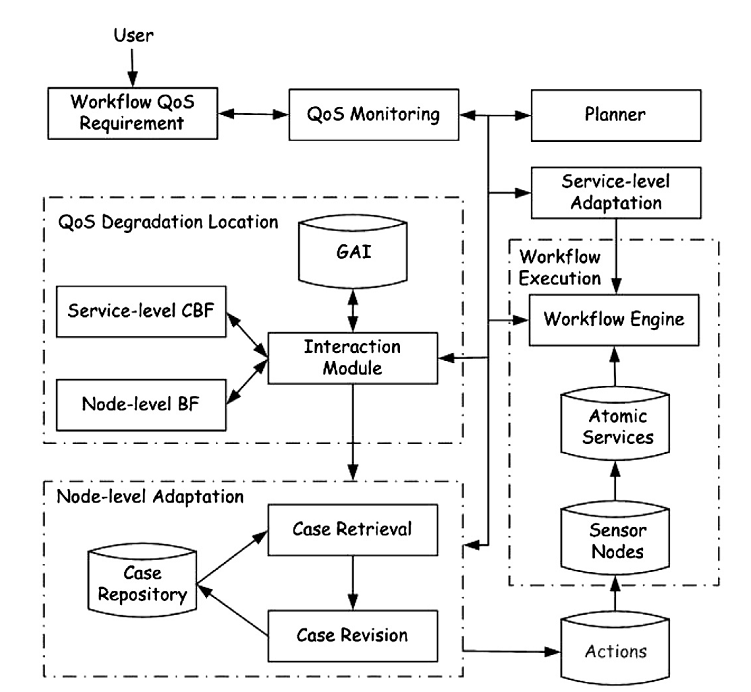As a popular service composition technology, workflow has been successfully used in wireless sensor networks (WSNs) to compose a set of atomic services for service-oriented WSN applications. However, in a resource-constrained WSN, the sensed data is usually inaccurate or even missing, which affects the normal execution of atomic services and may result in the non-guaranteed workflow QoS. Since the implementation of workflows in WSNs is usually hierarchical, effective workflow management in a WSN should consider both aspects of atomic services and sensor nodes, though this has largely been overlooked in existing research. Hence, a dynamic QoS-oriented, effective and efficient hierarchical workflow management mechanism is necessary.
Researchers from the Institute of Acoustics, Chinese Academy of Sciences propose a Bloom filter-based hierarchical workflow management model (see Fig.1), which coordinates both the atomic service level and the node level for guaranteed workflow QoS. Through constructing the service-level counting Bloom filter to maintain the set of normal atomic services, as well constructing the node-level Bloom filter to maintain the set of attribute strings of the current working nodes, an effective and efficient QoS degradation locating can be realized. Furthermore, the corresponding adaptation mechanism for guaranteed QoS is also developed.

Fig.1 Bloom filter-based hierarchical workflow management model (Image by TONG).
The case study and experimental evaluations demonstrate the capability of the proposed approach in WSNs. Results from experiments indicate that the proposed approach is much more efficient in space and time compared with the simple linked list-implemented approach. Besides, it also achieves a greater success ratio to guarantee workflow QoS in WSNs compared with a traditional workflow management approach. Future research will continue to focus on node-level management. Particularly, action should be taken to improve the corresponding atomic service QoS after identifying abnormal sensor nodes.
This research is supported by the National Natural Science Foundation of China (No. 61103158), the National Science & Technology Pillar Program of China (No. 2012BAH01B03), the Deakin CRGS 2011 and the Securing CyberSpaces Research Cluster of Deakin University, Guangxi Key Laboratory of Trusted Software, the National Basic Research Program of China (No. 2013CB329502), the Sino-Finnish International S&T Cooperation and Exchange Program (No. 2010DFB10570), the Strategic Pilot Project of Chinese Academy of Sciences (No. XDA06010302), and the Ultra-realistic Acoustic Interactive Communication on Next-Generation Internet (No. 11110036).
Journal References:
TONG Endong, NIU Wenjia, LI Gang, TANG Ding, CHANG Liang, SHI Zhongzhi and CI Song. Bloom Filter-based Workflow Management to Enable QoS Guarantee in Wireless Sensor Networks. JOURNAL OF NETWORK AND COMPUTER APPLICATIONS (vol. 39, pp. 38-51, MAR 2014). DOI: 10.1016/j.jnca.2013.04.002
Corresponding author:
TONG Endong, High Performance Network Lab, Institute of Acoustics, Chinese Academy of Sciences, Beijing 100190, China
Email: Tonged@hpnl.ac.cn


